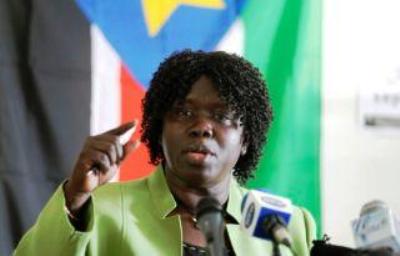SPLM denies targeting of ethnic groups
December 20, 2013 (JUBA) – A leading member of South Sudan’s governing Sudan People’s Liberation Movement (SPLM), Anne Itto, said it was not the policy of the army and the government to ethnically target and kill people based on their ethnic backgrounds, stressing her party believes in unity in diversity.

“But this is not a policy of the army and it’s not a policy of the government and we must make sure that it does not happen.”
She was speaking to journalists at a news briefing convened by the former rebel movement, which has governed South Sudan since a 2005 peace deal and steered the region to independence from Sudan in 2011.
The official, however, expressed confidence in the leadership of her party together with the government and well-wishers as well as the general public to work together to defuse tension.
“I am confident this situation would be contained and resolved immediately because [the] strength of the SPLM had been consistently tested. We have seen this before. People like Riek Machar, Lam Akol, the list is long left during such difficult times and the SPLM managed and continued to exist. They were accepted when they returned because we in the SPLM believe in unity and carrying together our people to consolidate peace and reconciliation”, explained Itto.
On Monday President Salva Kiir accused his former deputy Riek Machar and other of planning a coup against him. This has been denied but the fight that broke-out at the headquarters of the presidential guards spread to others parts of the army resulting in an estimated 500 deaths in the capital.
Fighting has since spread to other parts of the country, notably Jonglei state where Peter Gatdet has led a mutiny which has taken control of the state capital, Bor.
SOUTH SUDAN NOT A TWO TRIBE STATE
Meanwhile, James Kok Ruei, a former minister of humanitarian affairs and disaster management categorically stated that South Sudan is a not two tribe state but that it belongs to all its inhabitants.
“I want to tell our people, the Nuer that you have been misguided to believe that what happened in Juba is a conflict between the Nuer and the Dinka. This is totally not correct. What happened in Juba was an attempt by individual politicians to take power through violence”, said Ruei.
Paul Mayom Akec a former minister of irrigation and water resources says his country should have learned from other neighbouring countries in Central and East Africa and avoid their mistakes.
“As new nation, we should have learned from the experiences of other countries, unfortunately, there are people who believe that the short cut to getting into power is through violence, which is a wrong approach. Violence once started is difficult to control. It breeds violence if it is handled well”, said Akec in statement broadcast by South Sudan Television and Radio on Thursday.
He was speaking after holding a parliamentary briefing as members of the ruling party in the National Assembly, during which the group came with resolution to defuse tense situation.
“We have identified a problem that make civilian to run away from their houses.
It is the fear for safety. So we have come out with recommendation that all security organs should provide adequate protection in conformity to their constitutional mandate”, Akec explained.
Thousands of civilians have sought refuge at United Nations bases in Juba and elsewhere in the country.
Despite a report from Human Rights Watch claiming that civilians in Juba were targeted, the official further denied that there has been any ethnic fighting between the two major tribes.
“It is not true that there is an ethnic fighting as it is being circulated. The fighting we see in all the hospitals now comes from different states of South Sudan, and not just from the two or even one ethnic group. The Nuer and the Dinka have no problem. It is the politicians who are trying to polarise and exploit the situation to score their own political games,” said Akec.
Jok Madut Jok, an undersecretary in the ministry of youth, culture and sports, said though the developments in Juba could not be completely viewed as a coup, it must be seen as an actualisation of the warning which the dissident officials made prior to the eruption of violence.
“This is kind of their prophecy becoming fact.” Even if Machar did not lead a coup, Jok said, it is possible people loyal to him decided to follow through on his remarks.
On Thursday Machar, who is currently on the run with an arrest warrant on his head, described Kiir as illegitimate and called for the ruling party and army to depose him.
(ST)
